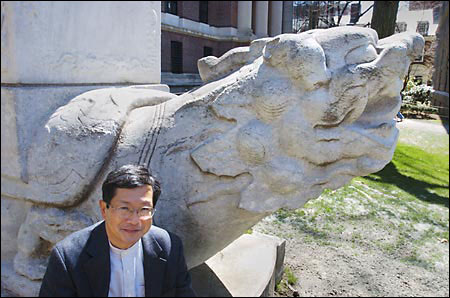Japanologist brings broad perspective
Kuriyama named Reischauer Institute Professor of Cultural History

Medical historian and Japanologist Shigehisa Kuriyama, who has brought an unusually broad perspective to the study of world medical history, has been appointed Reischauer Institute Professor of Cultural History in Harvard University’s Faculty of Arts and Sciences, effective July 1.
Kuriyama, 50, is currently on the faculty of the International Research Center for Japanese Studies, an elite state-supported research and graduate-level institution in Kyoto. He will become a faculty member in Harvard’s Department of East Asian Languages and Civilizations.
“Professor Kuriyama is among the world’s most innovative and erudite practitioners of comparative cultural history,” says William C. Kirby, Edith and Benjamin Geisinger Professor of History and dean of the Faculty of Arts and Sciences. “The intellectual force of his work has already brought disparate humanistic traditions into conversation; similarly, I expect that his appointment will create further dialogue between our Department of East Asian Languages and Civilizations and others in the Department of the History of Science, the Harvard Medical School, and the Harvard Divinity School.”
Kuriyama won international acclaim for his 1999 book “The Expressiveness of the Body, and the Divergence of Greek and Chinese Medicine,” an examination of how cultural and medical responses to human physiology diverged in these two ancient civilizations. In this work, Kuriyama shed new light on the cultural contrasts between ancient Greece and China by showing how their differing diagnostic traditions reflected other aspects of the Greek and Chinese worldview. Now translated into Chinese and Greek, the book was honored with the Oriental Medical Journal Award in 2000 and the William H. Welch Medal of the American Association for the History of Medicine in 2001.
Kuriyama’s work is informed not only by his strong cross-cultural focus, but also by his deep knowledge in fields as disparate as medical history, art history, and socioeconomics. His wide-ranging research is also notable for a historical scope encompassing centuries: For instance, Kuriyama has studied how Japan’s economic transformations from the 1600s to the present have affected the treatment and experience of illness and the body. He has also explored how the Japanese encounter with Western anatomy combined with the discovery of new styles of artistic representation to revolutionize Japanese perceptions of the body.
Kuriyama’s ongoing studies of a Japanese complaint called katakori, characterized by distinctive pains in the neck and upper shoulders, address one of the central issues of the anthropology of medicine: the relationship between culture and history on the one hand, and bodily experience on the other. He is currently exploring how Western, Japanese, and Chinese medical conceptions have coalesced in contemporary Japanese body consciousness.
A student of numerous languages, Kuriyama holds A.B. and A.M. degrees from Harvard’s Department of East Asian Languages and Civilizations, awarded in 1977 and 1978, respectively, and a Ph.D. from Harvard’s Department of the History of Science, received in 1986. After completing his education, he held posts at the University of New Hampshire as assistant professor of history from 1987 to 1989 and at Emory University as assistant professor in the Graduate Institute of the Liberal Arts from 1989 to 1993 and as director of the Program in Liberal Studies from 1989 to 1994. He joined the International Research Center for Japanese Studies in 1994.




